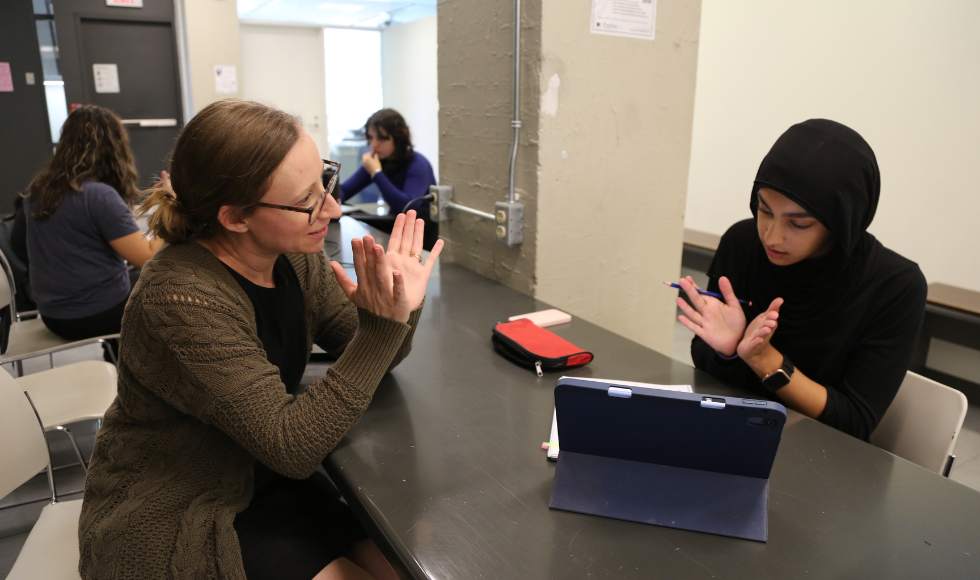Informal mentorship is part of the equation

Assistant professor Caroline Junkins explains a key concept to first-year Arts & Science student Safiyya Hasan. It was Safiyya's first time going to office hours at McMaster and she gave high marks to the experience of sitting around a table with Junkins and her classmates.
Students no longer line up and wait their turn to meet with Caroline Junkins behind closed doors during office hours.
Instead, Junkins invites students to join her by pulling up a seat and squeezing in around a packed hallway table in Hamilton Hall.
Junkins, an assistant professor in the Department of Mathematics and Statistics, reimagined her office hours because of what she’d heard during a student workshop at Harvard University.
First-generation students and students from low-income families had developed the workshop to share their experiences with faculty. Junkins, who was a member of the preceptor team in Harvard’s mathematics department, volunteered to sit in on the workshop’s pilot run and offer feedback to the students.
They didn’t hold back when it came to office hours. Meeting with professors behind closed doors was intimidating and often left them feeling even more marginalized. Some of the students shared stories of long waits followed by short meetings with rude, dismissive and disinterested faculty.
Junkins – who aims to make math classes as equitable and inclusive as possible – was taken aback. “We’re so friendly, why would any student ever feel scared? But the students told us that didn’t matter – they’d never even make it to our doors. They didn’t see a professor’s office as a safe place for them. This made us sad and we decided to do something about it.”
When Junkins joined McMaster five years ago, she’d occasionally meet with groups of students at the hallway table across from her office. The tables are a hallmark of Hamilton Hall – Junkins had spent countless hours at the tables with classmates while earning her bachelor’s and master’s degrees in mathematics. “Math isn’t meant to be done alone at home in silence.” The tables encourage students to talk with each other. “It’s okay to get loud when it comes to math.”
Acting on the feedback from the students at Harvard, Junkins has decided this year to move all of her office hours to the hallway tables.
Along with reducing the power imbalance between students and faculty, making office hours a communal experience has other key benefits, says Junkins.
Students are meeting their classmates in a familiar place – many friendships and relationships can be traced back to initial conversations around the tables in Hamilton Hall. When students sit down at the table, they quickly realize they’re not the only ones struggling. Junkins and her students fill the chalkboards that line the walls of Hamilton Hall with equations – students joining midway through office hours often find the solution to their problem already written out.
The best thing that happens when office hours go communal? There’s spontaneous collaboration. Everyone helps each other out, moving freely between the roles of teacher and student. Junkins says she’s happy to be relegated to a supporting role.
She understands why some faculty may prefer sticking with traditional office hours. “You may be worried that you’ll waste an hour sitting alone at a table when you have so much other work you could be doing back in your office if no students drop by.” That’s yet to happen to Junkins who ends her lectures by inviting students to walk with her across campus to Hamilton Hall for office hours.
Junkins – who teaches a first-year calculus course in the Arts & Science program along with undergraduate courses in the Department of Mathematics & Statistics – says sitting down with a group of students is actually a time-saver, especially for faculty who teach and coordinate large classes. There’s not enough hours in her day for Junkins to meet with every student one-on-one and repeatedly answer the same questions.
“When everyone’s around a table, students are helping each other and you can slip away. Often times, students don’t even notice that I’ve left for a lecture, meeting or headed home.”
Safiyya Hasan is one of the students in the Arts & Science intro calculus course. In her second week, she went to see Junkins for help – it was her first time going to office hours at Mac. “I didn’t know what to expect. I thought I’d have to wait in line however I was pleasantly surprised. I liked how it was in a group setting. Dr. Junkins was extremely helpful, friendly and approachable.”


